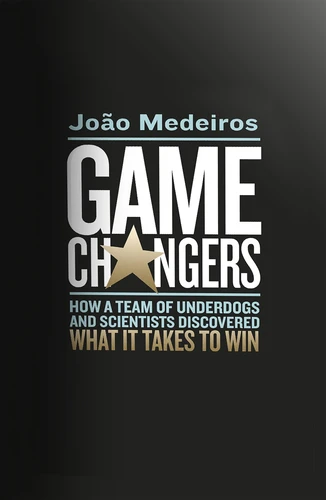Game Changers. How a Team of Underdogs and Scientists Discovered What it Takes to Win
Par :Formats :
Disponible dans votre compte client Decitre ou Furet du Nord dès validation de votre commande. Le format ePub protégé est :
- Compatible avec une lecture sur My Vivlio (smartphone, tablette, ordinateur)
- Compatible avec une lecture sur liseuses Vivlio
- Pour les liseuses autres que Vivlio, vous devez utiliser le logiciel Adobe Digital Edition. Non compatible avec la lecture sur les liseuses Kindle, Remarkable et Sony
- Non compatible avec un achat hors France métropolitaine
 , qui est-ce ?
, qui est-ce ?Notre partenaire de plateforme de lecture numérique où vous retrouverez l'ensemble de vos ebooks gratuitement
Pour en savoir plus sur nos ebooks, consultez notre aide en ligne ici
- Nombre de pages416
- FormatePub
- ISBN978-1-4087-0847-7
- EAN9781408708477
- Date de parution29/08/2018
- Protection num.Adobe DRM
- Infos supplémentairesepub
- ÉditeurLittle, Brown Book Group
Résumé
At the 1996 Atlanta Olympics, Great Britain ranked thirty-sixth in the medals table, finishing below countries like Algeria, Belgium and Kazakhstan. It was their worst ever record, a dismal performance labelled a national disgrace. But then something happened. In Sydney in 2000 and then Athens in 2004, Team GB achieved a much more respectable tenth place. By 2016, in Rio, they finished second, above China and Russia, with sixty-seven medals.
How have they so convincingly reversed their fortunes?In Game Changers we meet the coaches and sports scientists who rethink how sport is analysed and understood, how athletes train and perform under pressure. In Liverpool in the 1980s, a motley group - a mathematician, a physiologist, a psychologist and a former Olympic basketball player - began to pioneer new ways of tracking performance. Over the decades that followed, performance analysis came of age, becoming an essential component of any elite team, from English Premier League title winners Manchester City to America's Cup high-performance sailing teams.
Using a hybrid of scientific method and trial-and-error, scientists have uncovered the tenets of accelerated learning, the mechanics of physiological adaptation, the organisational principles behind elite teams, the understanding of how hormones and environment affect performance. These discoveries are not confined to athletic endeavours - they are universal and reveal what it takes to win not only in sports, but are applicable across a wide range of disciplines, including business, leadership and education.
How have they so convincingly reversed their fortunes?In Game Changers we meet the coaches and sports scientists who rethink how sport is analysed and understood, how athletes train and perform under pressure. In Liverpool in the 1980s, a motley group - a mathematician, a physiologist, a psychologist and a former Olympic basketball player - began to pioneer new ways of tracking performance. Over the decades that followed, performance analysis came of age, becoming an essential component of any elite team, from English Premier League title winners Manchester City to America's Cup high-performance sailing teams.
Using a hybrid of scientific method and trial-and-error, scientists have uncovered the tenets of accelerated learning, the mechanics of physiological adaptation, the organisational principles behind elite teams, the understanding of how hormones and environment affect performance. These discoveries are not confined to athletic endeavours - they are universal and reveal what it takes to win not only in sports, but are applicable across a wide range of disciplines, including business, leadership and education.
At the 1996 Atlanta Olympics, Great Britain ranked thirty-sixth in the medals table, finishing below countries like Algeria, Belgium and Kazakhstan. It was their worst ever record, a dismal performance labelled a national disgrace. But then something happened. In Sydney in 2000 and then Athens in 2004, Team GB achieved a much more respectable tenth place. By 2016, in Rio, they finished second, above China and Russia, with sixty-seven medals.
How have they so convincingly reversed their fortunes?In Game Changers we meet the coaches and sports scientists who rethink how sport is analysed and understood, how athletes train and perform under pressure. In Liverpool in the 1980s, a motley group - a mathematician, a physiologist, a psychologist and a former Olympic basketball player - began to pioneer new ways of tracking performance. Over the decades that followed, performance analysis came of age, becoming an essential component of any elite team, from English Premier League title winners Manchester City to America's Cup high-performance sailing teams.
Using a hybrid of scientific method and trial-and-error, scientists have uncovered the tenets of accelerated learning, the mechanics of physiological adaptation, the organisational principles behind elite teams, the understanding of how hormones and environment affect performance. These discoveries are not confined to athletic endeavours - they are universal and reveal what it takes to win not only in sports, but are applicable across a wide range of disciplines, including business, leadership and education.
How have they so convincingly reversed their fortunes?In Game Changers we meet the coaches and sports scientists who rethink how sport is analysed and understood, how athletes train and perform under pressure. In Liverpool in the 1980s, a motley group - a mathematician, a physiologist, a psychologist and a former Olympic basketball player - began to pioneer new ways of tracking performance. Over the decades that followed, performance analysis came of age, becoming an essential component of any elite team, from English Premier League title winners Manchester City to America's Cup high-performance sailing teams.
Using a hybrid of scientific method and trial-and-error, scientists have uncovered the tenets of accelerated learning, the mechanics of physiological adaptation, the organisational principles behind elite teams, the understanding of how hormones and environment affect performance. These discoveries are not confined to athletic endeavours - they are universal and reveal what it takes to win not only in sports, but are applicable across a wide range of disciplines, including business, leadership and education.



